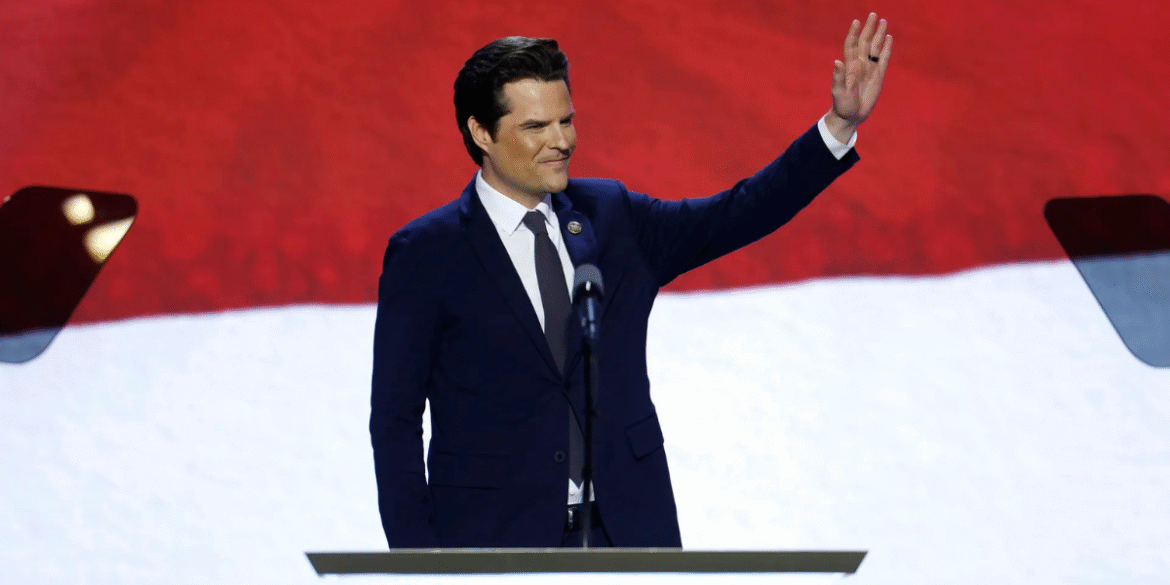The Trump transition team has encountered a major setback following the highly controversial nomination of Representative Matt Gaetz for the position of Attorney General. What was initially viewed as an attempt to bolster ties with Trump’s conservative base quickly turned into a public relations nightmare. The backlash was so overwhelming that Gaetz was forced to withdraw his nomination, leaving the transition team grappling with damage control and raising serious concerns about its vetting process.
Gaetz’s Nomination Sparks Immediate Controversy
Matt Gaetz, a vocal supporter of President Trump, was selected to lead the Justice Department at a time when Trump was aiming to reinforce his alignment with the conservative wing of the party. However, the nomination was met with immediate controversy. Gaetz’s personal and legal history, particularly his ongoing investigation into allegations of sexual misconduct and other ethical concerns, made his appointment highly contentious. Although Gaetz has denied the accusations and has not been formally charged, these unresolved legal issues cast a shadow over his political career and were seen as too significant to overlook for such a key role in the administration.
The criticism was swift and widespread. Both Democratic and Republican lawmakers voiced concerns, with some Republicans privately warning that Gaetz’s controversial past could undermine the incoming administration’s credibility. Democrats seized on the nomination as yet another example of what they perceived to be a disregard for ethical standards within Trump’s political circle. The controversy surrounding Gaetz highlighted the delicate task President Trump faces in maintaining loyalty within his base while also ensuring the new administration’s credibility.
Questions Arise Over the Vetting Process
The swift withdrawal of Gaetz’s nomination raised troubling questions about the transition team’s vetting process. The appointment of someone with such a checkered history for a critical position, especially early in the administration, pointed to potential shortcomings in the selection process. A spokesperson for the transition team had previously assured that all candidates undergo “rigorous background checks,” yet the nomination of Gaetz suggests that the scrutiny may not have been as thorough as required.
This misstep has sparked concerns about the overall integrity of the team’s vetting procedures, especially with other key positions yet to be filled. The fact that a high-profile nomination was made without apparent consideration of potential controversies has led some to speculate that the team might have prioritized loyalty over careful evaluation. The damage to the team’s credibility is significant, raising calls for a more cautious and methodical approach to future appointments.
Challenges in Forming the Cabinet
The fallout from Gaetz’s nomination comes at a time when Trump faces numerous challenges in assembling his cabinet. In addition to the concerns over legal and ethical issues surrounding some of the other rumored nominees, Gaetz’s failed candidacy has cast doubt on the team’s ability to select qualified individuals for critical positions. Trump, known for prioritizing loyalty and media appeal over traditional qualifications, now finds himself in a position where balancing these priorities with the need for competent and trustworthy leaders is more difficult than ever.
The role of Attorney General is particularly important, as the person in this position will oversee the enforcement of federal laws and ensure accountability within the government. The fallout from Gaetz’s nomination underscores the challenge of finding someone who can navigate the complexities of the role while maintaining public trust. Trump will need to find a nominee who not only aligns with his political vision but also possesses the integrity and qualifications to effectively serve in such a vital capacity.
The process of forming a cabinet has become increasingly difficult for the incoming administration. The Gaetz nomination debacle serves as a reminder that selecting individuals for high-level positions requires a careful balance of loyalty, qualifications, and ethical standards. Moving forward, the transition team will need to reconsider its approach to appointments, ensuring that candidates are thoroughly vetted to avoid further controversies.

